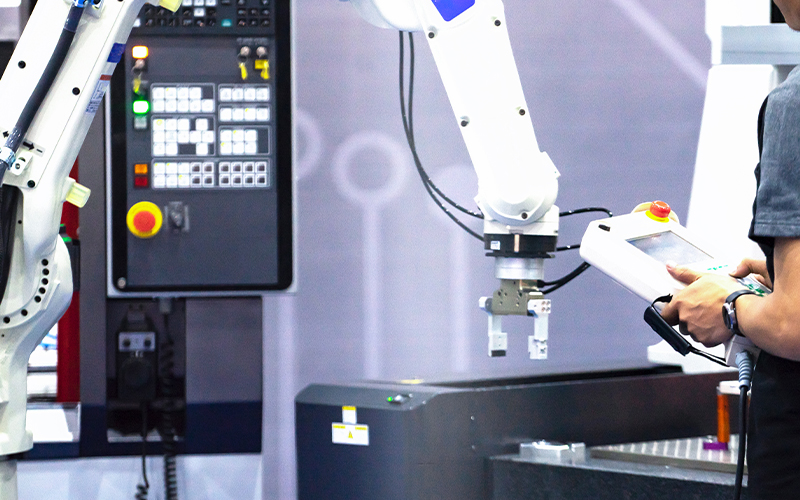Robotic Process Automation
A brief introduction of automation scripts
How do you define automation scripts? Automation scripts comprise small and targeted pieces of code that you can execute using a GUI-based wizard. The backend RPA process usually runs on scripting languages such as PHP, Perl, VBScript, Jython, JavaScript, and Python. For example, CRM super admins can use a wizard to set up workflows to automatically shoot an email to the customer regarding a deal on their products or services. If the customer sends their acceptance, the robotic process automation (RPA) moves the deal in the sales pipeline to the closed stage and forwards the record into the accounting system for billing.
Studies show that 31% of companies in the US have achieved full automation in at least one key business function. About 94% of professionals prefer a unified platform that automates all application workflows. In India, the adoption of RPA is set to grow at 57% in 2022. About 76% of the companies plan to automate several rule-based and repetitive tasks to save time and costs. To put the ROI numbers in perspective, a global health technology firm used RPA to save €24 million in expenses and 1 million in person-hours. While 40% of the large organisations use automation in their businesses, the number is 25% among small organisations. There is a large scope for businesses to ramp up their automation efforts using scripts.
The benefits of scripting automation
Among the different workflow automation technologies, artificial intelligence (AI) has gained 18% adoption, whereas RPA is at 31% and gaining ground fast. Let us understand the benefits of using scripting and automation along with RPA for the above CRM example.
- Server-side execution: Cloud-based RPA tools run the scripts on powerful backend servers and not on your local systems or browsers. This makes the process fast no matter how often the system invokes the script.
- 100% system uptime: The RPA service provider deploys new features on cloud servers and pushes them as an update on your client’s system. This means that there are no system outages while deploying automation scripts.
- User friendly: In the CRM example above, when the super admin sets up a workflow in the CRM, they will see default and user-friendly variables to enhance the functionality. They don’t need the technical knowledge of scripting or API.
- One-to-many mapping: A single script can produce multiple results based on the variables you supply. This means less work for automation managers who configure your systems. You can utilise the workforce for other applications that demand human intervention.
- Eliminate errors: Script-based automation ensures no errors or missed actions due to human negligence or training gaps. In the example above, the CRM system automatically triggers an alert for the billing system without any delay, which could happen in manual processes.
Scripting automation applications
RPA uses scripts to automate all internal and external processes in various industries. Here are some examples.
RPA scripting application based on processes
- Sales: In terms of sales, businesses can generate up to three times more leads every month, boost the productivity of the sales department, and lower operational costs. They can nurture leads for increase in conversions and upsell or cross-sell products quickly.
- Marketing and advertising: Marketing and advertising professionals can increase conversions on their marketing spend and retention rates. It is no surprise that more than half of Fortune 500 companies use marketing automation and the number is rising steadily.
RPA scripting applications based on industries
- Finance: A leading Indian bank reduced its time in addressing complaints about ATM cash from 12 hours to 4 hours using 750 robots. RPA can also help reduce the processing time of invoices by 10%.
- Cybersecurity: Businesses can reduce the time required to detect and respond to phishing attacks, thus saving themselves from loss of revenue and brand reputation.
- Insurance: By 2030, insurance agencies in the US plan to automate 46% of claims, including quote generation, reviews, and disbursement.
- Manufacturing: About 57% of business owners want to adopt automation to improve the productivity of operations and the quality of products. According to a research, robots will automate 42% of manufacturing tasks in 2022.
- Finance: A leading Indian bank reduced its time in addressing complaints about ATM cash from 12 hours to 4 hours using 750 robots. RPA can also help reduce the processing time of invoices by 10%.
- Cybersecurity: Businesses can reduce the time required to detect and respond to phishing attacks, thus saving themselves from loss of revenue and brand reputation.
- Insurance: By 2030, insurance agencies in the US plan to automate 46% of claims, including quote generation, reviews, and disbursement.
- Manufacturing: About 57% of business owners want to adopt automation to improve the productivity of operations and the quality of products. According to a research, robots will automate 42% of manufacturing tasks in 2022.
For organisations on the digital transformation journey, agility is key in responding to a rapidly changing technology and business landscape. Now more than ever, it is crucial to deliver and exceed organisational expectations with a robust digital mindset backed by innovation. Enabling businesses to sense, learn, respond, and evolve like living organisms will be imperative for business excellence. A comprehensive yet modular suite of services is doing precisely that. Equipping organisations with intuitive decision-making automatically at scale, actionable insights based on real-time solutions, anytime/anywhere experience, and in-depth data visibility across functions leading to hyper-productivity, Live Enterprise is building connected organisations that are innovating collaboratively for the future.
How can Infosys BPM help with RPA scripting?
The rules-based and knowledge-based RPA solutions provide unprecedented agility. The straight-through and touchless process improves efficiency, enhances business value, and ensures innovative service design. Read detailed information on RPA automation at Infosys BPM.







